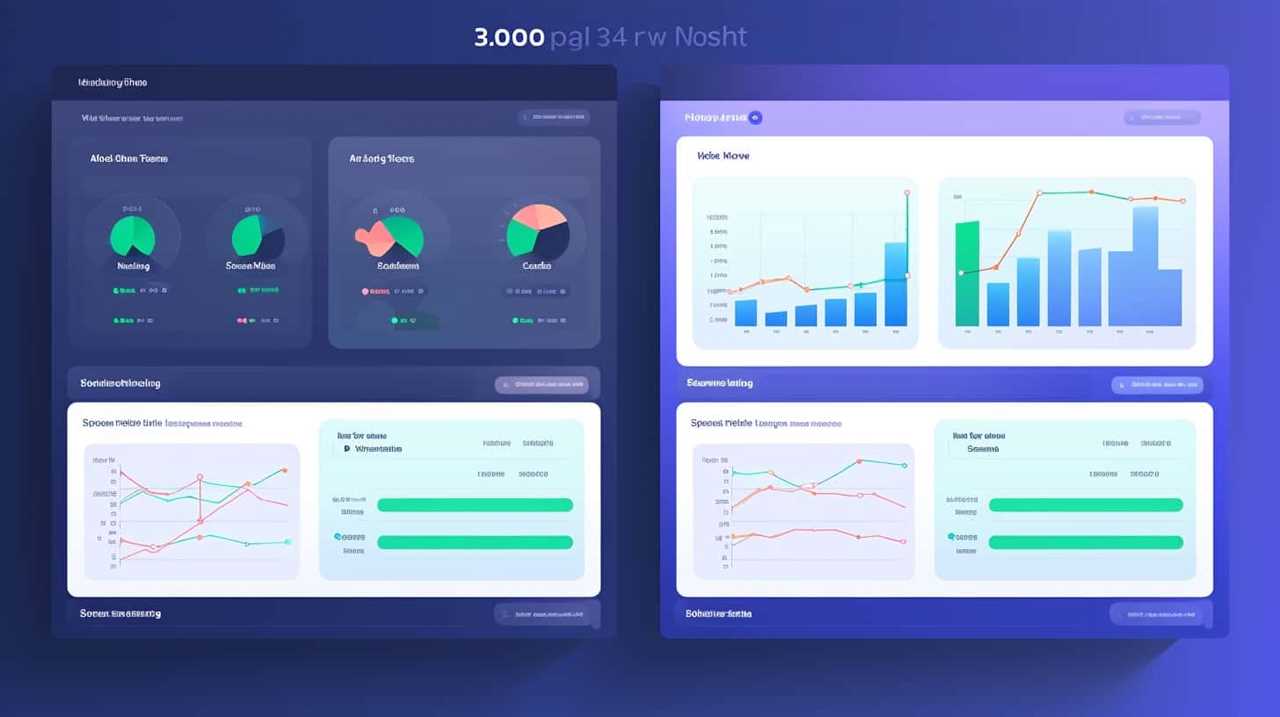Are you ready to master SEO for your niche store? We possess all the guidance and tactics essential for thriving in specialized markets.
From understanding your target audience to optimizing your website’s on-page elements, we’ll show you how to make your store stand out in search rankings.
With our guide, you’ll be able to identify relevant keywords, analyze competitors, and create high-quality content that drives traffic.
Don’t miss out on the latest SEO trends – let’s get started!

Key Takeaways
- Thoroughly understand the target audience and their needs and preferences in order to effectively navigate SEO for niche markets.
- Conduct comprehensive market research to identify the target audience, including analyzing data on demographics, interests, and online behavior.
- Create buyer personas to gain a deep understanding of the audience’s pain points and preferences, which can inform niche marketing strategies.
- Conduct keyword research and optimization, focusing on long tail keywords specific to the specialty store, and incorporating relevant keywords into website content, meta tags, and URLs.
Understand Your Niche Market
To effectively navigate SEO for niche markets, we must thoroughly understand our target audience and their specific needs and preferences. Understanding our target audience is the foundation of effective niche marketing strategies. By gaining insight into their behaviors, demographics, and motivations, we can tailor our SEO efforts to meet their unique requirements.
To begin, we need to conduct thorough market research to identify our target audience. This includes analyzing data on their demographics, interests, and online behavior. By doing so, we can create buyer personas that represent our ideal customers. These personas help us understand our audience’s pain points, desires, and preferences, enabling us to develop targeted content that resonates with them.
Once we’ve a clear understanding of our target audience, we can develop effective niche marketing strategies. This involves optimizing our website and content to rank highly in search engine results for relevant keywords and phrases. By using keyword research tools, we can identify the most valuable keywords for our niche market and optimize our content accordingly. Additionally, we can create targeted landing pages and optimize our website’s structure to enhance user experience and encourage conversions.
Identify Relevant Keywords
We begin by researching and uncovering the most relevant keywords for our niche market. Keyword research is a crucial step in optimizing our website for search engines and reaching our target audience. We need to identify the specific words and phrases that our potential customers are using when searching for products or services in our niche.

While broad keywords may seem appealing, they’re often highly competitive and difficult to rank for. Instead, we focus on long tail keywords, which are longer, more specific phrases that are highly relevant to our specialty store. These keywords may have lower search volume, but they also have less competition, allowing us to target a more specific audience.
To conduct effective keyword research, we utilize various tools and techniques. We start by brainstorming potential keywords related to our niche and then use keyword research tools to identify additional relevant keywords. We analyze search volume, competition, and relevance to prioritize the keywords we want to target.
By incorporating these keywords into our website’s content, meta tags, and URLs, we can increase our visibility in search engine results and attract organic traffic from our target market.
With our relevant keywords identified and implemented, we’re now ready to move on to the next step: conducting competitor research.

Conduct Competitor Research
After identifying relevant keywords, the next step in navigating SEO for niche markets is conducting competitor research. Competitor analysis is crucial for gaining insights into what strategies and tactics are working for other businesses in your industry. By analyzing their SEO efforts, you can identify trends and opportunities to improve your own website’s visibility and rankings.
Here are four key reasons why competitor research is essential:
- Identifying keyword gaps: By analyzing your competitors’ websites, you can uncover keywords they’re targeting that you may have missed. This helps you identify gaps in your keyword strategy and allows you to optimize your website for those keywords.
- Benchmarking performance: Competitor research allows you to compare your website’s performance against your competitors’. This helps you understand where you stand in terms of SEO rankings, traffic, and engagement metrics, and enables you to set realistic goals for improvement.
- Discovering content opportunities: By analyzing your competitors’ content, you can identify topics and formats that resonate well with your target audience. This helps you create compelling and relevant content that attracts and engages your potential customers.
- Staying ahead of SEO trends: Competitor research allows you to stay updated on the latest SEO trends and strategies in your industry. By monitoring your competitors’ SEO efforts, you can adapt and implement new techniques to ensure your website remains competitive in search rankings.
Optimize Your Website’s On-Page Elements
By optimizing our website’s on-page elements, we can improve its visibility and search engine rankings. Keyword optimization is a crucial aspect of on-page SEO. It involves strategically incorporating relevant keywords throughout our website’s content, including headings, titles, and descriptions. By doing so, we can signal to search engines what our website is about and increase the likelihood of appearing in relevant search results.
Another important on-page element to optimize is meta tags. Meta tags are snippets of HTML code that provide information about a webpage to search engines. They include the title tag, which appears as the clickable headline in search results, and the meta description tag, which provides a brief summary of the page’s content. Optimizing our meta tags with relevant keywords and compelling descriptions can entice users to click on our website in search results, improving our click-through rates.

Create High-Quality and Relevant Content
When it comes to optimizing SEO for niche markets, targeted keywords are essential for driving organic traffic to your specialty store’s website. By conducting thorough keyword research and incorporating these keywords strategically throughout your content, you can increase your visibility in search engine results.
Additionally, creating high-quality and relevant content is crucial for user engagement and retention, as it provides value to your audience and encourages them to stay on your site longer.
Targeted Keywords for SEO
To effectively optimize SEO for niche markets, we prioritize creating high-quality and relevant content by targeting specific keywords.
Keyword research is crucial in identifying the most relevant and popular search terms used by our target audience. By conducting thorough keyword research, we can uncover valuable insights and discover long tail keywords that have less competition but higher conversion rates.

These long tail keywords are more specific and targeted, allowing us to attract a more qualified audience to our specialty store. Additionally, incorporating these targeted keywords into our content helps search engines understand the relevance and value of our website, improving our visibility and rankings in search results.
User Engagement and Retention
Creating high-quality and relevant content is essential for engaging and retaining users in niche markets. When it comes to user engagement and retention, user feedback plays a crucial role.
By actively seeking user feedback, specialty stores can gain valuable insights into their customers’ needs and preferences. This information can then be used to create personalized recommendations, which not only enhance the user experience but also increase user satisfaction and loyalty.
High-quality content that’s tailored to the specific interests of niche market users can help establish a strong connection with them. By consistently delivering valuable and informative content, specialty stores can keep their users engaged, encourage repeat visits, and build long-term relationships.

Ultimately, by prioritizing user engagement and retention through the creation of high-quality and relevant content, specialty stores can strengthen their position in their niche market.
Implement Local SEO Strategies
We actively incorporate local SEO strategies to optimize our specialty store’s online presence. By implementing these strategies, we ensure that our store is visible to potential customers in our local area, increasing our chances of attracting more foot traffic and generating higher sales.
Here are some key local SEO strategies we employ:
- Local citation building: We focus on creating accurate and consistent online listings for our store across various local directories, such as Google My Business, Yelp, and Yellow Pages. This helps to improve our store’s visibility in local search results and increases our credibility among local customers.
- Online reputation management: We actively monitor and manage our online reviews and ratings. By responding promptly to customer feedback and addressing any concerns or issues, we demonstrate our commitment to customer satisfaction and build a positive online reputation.
- Geographic keyword optimization: We optimize our website content and meta tags with relevant geographic keywords to target local customers searching for specialty stores in our area. This helps to improve our store’s visibility in local search results and attract more qualified traffic.
- Local link building: We actively seek opportunities to build quality backlinks from local websites and directories. These local links help to improve our store’s authority and relevance in the eyes of search engines, further boosting our local search rankings.
Implementing these local SEO strategies has proven to be effective in driving more local customers to our specialty store. Now, let’s explore how we can further enhance our online presence through social media marketing.

Utilize Social Media Marketing
Social media platforms offer valuable opportunities for specialty stores to connect with their target audience and promote their products or services. By utilizing social media marketing, specialty stores can reach a wider audience and increase brand visibility.
One effective strategy is to collaborate with influencers in the niche market. Influencer collaborations allow specialty stores to leverage the influencer’s credibility and reach to promote their products or services. This can be done through sponsored posts, product reviews, or giveaways. By partnering with influencers who have a strong following and influence in the niche market, specialty stores can tap into their audience and generate interest in their offerings.
Another effective approach is social media advertising. With the ability to target specific demographics, interests, and behaviors, social media platforms provide a powerful advertising tool for specialty stores. By creating targeted ads, specialty stores can reach their ideal customers and drive traffic to their website or physical store. It’s important to optimize ad content and design to ensure maximum engagement and conversion.
In addition to influencer collaborations and social media advertising, specialty stores should also focus on building high-quality backlinks to improve their SEO efforts.

Build High-Quality Backlinks
When it comes to improving our website’s SEO for niche markets, one important aspect to consider is building high-quality backlinks.
Backlinks are essential for boosting our website’s visibility and credibility in search engine rankings.
Link Building Strategies
One important aspect of SEO for niche markets is implementing effective link building strategies to build high-quality backlinks. Here are some key strategies to consider:
- Guest posting: Collaborate with other websites in your niche and offer to write guest posts for them. This allows you to showcase your expertise and gain valuable backlinks.
- Directory submissions: Submit your website to relevant directories and niche-specific listing websites. This helps improve your visibility and credibility within your niche.
- Content promotion: Share your content on social media platforms, industry forums, and online communities. This can attract attention and encourage others to link back to your website.
- Influencer outreach: Connect with influencers in your niche and build relationships. By collaborating with them, you can gain exposure to their audience and potentially earn backlinks.
Importance of Backlinks
Effective link building is crucial for specialty stores to establish the importance of backlinks and build high-quality backlinks. Backlinks play a significant role in boosting a website’s visibility and authority in search engine rankings. To help you understand the importance of backlinks, here are some key backlink building techniques and link building strategies for niche markets:

| Backlink Building Techniques | Link Building Strategies for Niche Markets |
|---|---|
| Guest blogging | Collaborate with influencers in your niche |
| Broken link building | Create valuable content that attracts links |
| Social media engagement | Participate in industry forums and discussions |
Implementing these strategies will help your specialty store gain valuable backlinks from authoritative websites in your niche, which can significantly improve your search engine rankings and drive targeted organic traffic to your site. Remember to focus on building high-quality backlinks rather than quantity to ensure long-term success in your SEO efforts.
Optimize Your Website for Mobile Devices
To enhance user experience and boost mobile visibility, our specialty store must optimize its website for mobile devices. Mobile optimization is crucial in today’s digital landscape as more and more people are using their smartphones and tablets to browse the internet. By implementing responsive design, we can ensure that our website adapts seamlessly to different screen sizes and resolutions.
Here are four key steps to optimize our website for mobile devices:
- Implement a responsive design: This ensures that our website layout and content automatically adjust to fit various screen sizes, providing a consistent and user-friendly experience.
- Optimize page load speed: Mobile users expect fast-loading websites, so we must optimize our site’s performance by compressing images, minifying code, and leveraging browser caching.
- Simplify navigation: Mobile users have limited screen space, so we should streamline our navigation menu and make it easy for them to find what they’re looking for.
- Use mobile-friendly fonts and buttons: Ensure that the text is legible and the buttons are large enough to be easily tapped on a touchscreen device.
Monitor and Analyze Your SEO Performance
Let’s talk about how to monitor and analyze your SEO performance.

To ensure that your website is ranking well in search engines, it’s important to track your keyword rankings regularly.
Track Keyword Rankings
Tracking keyword rankings is an essential practice for specialty stores like ours to monitor and analyze our SEO performance. By keeping a close eye on our keyword rankings, we can make informed decisions to improve our website’s visibility and drive targeted traffic.
Here are some key reasons why tracking keyword rankings is crucial for our specialty store:
- Identify top-performing keywords: Tracking keyword rankings allows us to identify which keywords are driving the most traffic to our website.
- Measure SEO effectiveness: By monitoring keyword rankings, we can evaluate the effectiveness of our SEO efforts and make necessary adjustments.
- Stay ahead of competitors: Tracking keyword rankings helps us stay competitive by keeping an eye on our competitors’ keyword rankings and identifying opportunities for improvement.
- Optimize content strategy: By analyzing keyword rankings, we can identify gaps in our content strategy and create targeted content to improve our search engine visibility.
Use Analytics Tools
How can we effectively monitor and analyze our SEO performance for our specialty store? To gain valuable insights, we must utilize analytics tools. These tools provide us with data on website traffic, user behavior, and keyword performance. By tracking and analyzing this information, we can make data-driven decisions to optimize our SEO strategy.

One essential analytics tool is Google Analytics. It allows us to monitor website traffic, identify high-performing pages, and track user engagement. We can also use Google Search Console to analyze our website’s visibility in search results and identify opportunities for improvement.
Additionally, conducting thorough keyword research is crucial for understanding our target audience’s search behavior. Tools like SEMrush and Moz Keyword Explorer provide valuable data on keyword search volume, competition, and trends. This information allows us to optimize our website content and target relevant keywords.
Utilize Google My Business for Local Visibility
To maximize local visibility, specialty stores can utilize Google My Business. This platform allows businesses to create a profile that appears in local search results and on Google Maps, making it easier for potential customers to find them.
Here are four reasons why Google My Business is essential for local visibility:

- Increased visibility: By creating a Google My Business profile, specialty stores can ensure that their business information is accurate and up-to-date, making it easier for local customers to find them when searching for relevant products or services.
- Customer reviews: Google My Business allows customers to leave reviews and ratings, providing social proof and influencing potential customers’ buying decisions. Positive reviews can also improve a store’s visibility in search results.
- Business insights: This platform provides valuable insights into customer behavior, such as the number of views, clicks, and calls generated from the listing. This data can help stores optimize their local SEO strategies and better understand their target audience.
- Local engagement: Google My Business enables specialty stores to engage with their local community by posting updates, offers, and events. This fosters a sense of trust and loyalty among customers, leading to increased visibility and repeat business.
Leverage Influencer Marketing
We have found that by leveraging influencer marketing, specialty stores can effectively reach their target audience and drive organic traffic to their website. Influencers are individuals who’ve a strong online presence and a loyal following in a specific niche. By forming influencer partnerships and engaging in influencer outreach, specialty stores can tap into the influencer’s audience, gaining exposure to a highly targeted group of potential customers.
One of the main advantages of influencer marketing is the ability to reach a niche market that may be difficult to target through other marketing channels. Influencers have already established trust and credibility with their audience, making their recommendations and endorsements highly influential. By partnering with influencers who align with the specialty store’s brand and target market, the store can leverage the influencer’s influence to promote their products or services.
When implementing an influencer marketing strategy, it’s important to carefully select influencers who’ve a genuine interest in the store’s niche and have an engaged audience that aligns with the store’s target market. Building strong relationships with influencers is crucial, as it allows for greater authenticity and credibility in their endorsements. By providing influencers with quality products or exclusive offers, specialty stores can incentivize them to promote their brand to their audience.
Stay Updated With SEO Trends and Best Practices
To stay ahead in niche markets, specialty stores must constantly stay updated on SEO trends and best practices. Keeping up with the ever-evolving world of search engine optimization is crucial for maintaining a competitive edge.

Here are some key areas to focus on:
- SEO for voice search: With the rise of voice assistants like Siri and Alexa, optimizing your website for voice search is essential. This involves using conversational language, answering common questions, and making sure your content is easily accessible through voice commands.
- Optimizing for featured snippets: Featured snippets are the concise answers that appear at the top of search engine results pages. By structuring your content in a way that’s easily scannable and provides direct answers to common queries, you increase your chances of being featured in these snippets.
- Mobile optimization: As more and more people use their smartphones to search for products and services, it’s crucial to have a mobile-friendly website. This includes having a responsive design, fast loading times, and easy navigation.
- User experience: Search engines prioritize websites that provide a positive user experience. This means having a clean and intuitive interface, relevant and engaging content, and fast loading times.
By staying updated on these SEO trends and best practices, specialty stores can improve their visibility in search engine results and attract more targeted traffic to their websites.
Mastering these techniques will help specialty stores stand out in their niche markets and drive business growth.
Conclusion
Well, congratulations! You have now mastered the art of navigating SEO for niche markets.

With our tips and tricks, you’re well-equipped to conquer the digital world and drive traffic to your specialty store.
Remember to stay updated with the latest SEO trends and never underestimate the power of high-quality content and influencer marketing.
So go ahead, embrace the irony of this conclusion and watch your online presence soar.
Happy optimizing!










